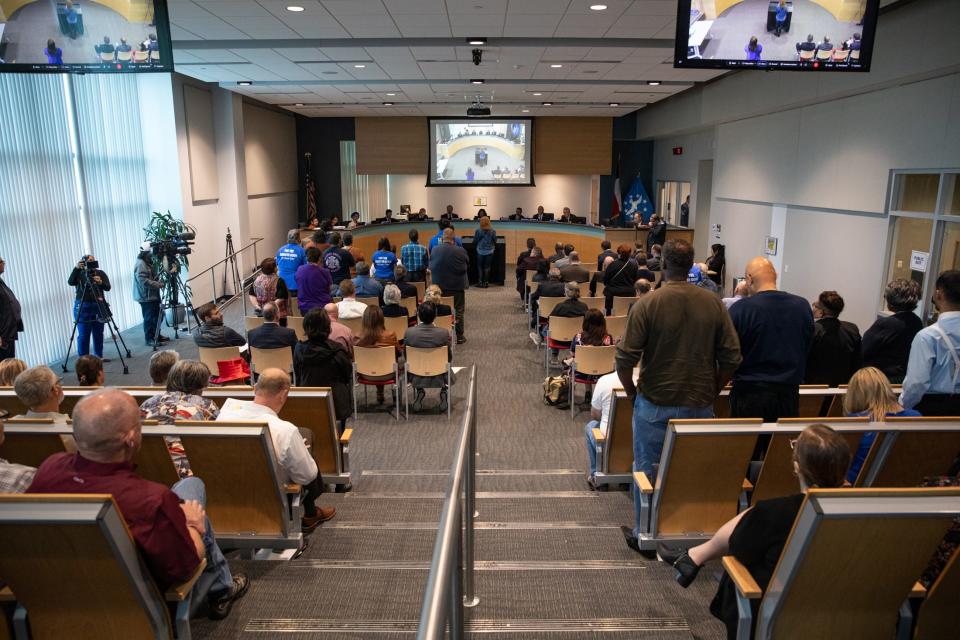Here's how building a desalination plant may impact water rates in Corpus Christi
The amount of money it may take operate a proposed seawater desalination plant – and how much ratepayers are projected to pay in coming years, should the plant be developed – has become more defined as Corpus Christi city officials prepare to finalize a decision about moving forward.
City officials recently announced a new estimate for the construction portion of the project at its Inner Harbor site, one which more than doubles an estimate from about five years ago.
Current estimates put construction of a plant capable of generating 30 million gallons of water per day at about $541.5 million, compared to a $220 million estimate in 2019 for a plant capable of generating 20 million gallons of water per day – a shift, city officials say, that has been driven by inflation and a significantly widened project scope.

Additional, non-construction costs identified since the 2019 estimate total about $216 million in supporting infrastructure, including the dollars needed for the proposed plant’s connection to the electrical grid, as well as investment in capital projects that would enable integration into the city’s water distribution system.
That brings the project total to an estimated $757.5 million. The city would seek grants and low-interest loans to defray some construction costs.
Answers to longstanding questions on how much it would likely cost ratepayers in future years – and how much operations and maintenance will cost – were also made available last week in presentations and subsequent documents.
Although water rates depend on multiple factors, what are considered average households are those using about 6,000 gallons per month.
Rates adopted this year amount to about $39 for the average household.
The number is expected to increase incrementally from the current $39.06 to about $61.60 in 2029, according to the presentation made before the City Council last week.
The figure accounts for current and future capital improvement projects, the documents show.
Costs for the proposed desalination plant development – in addition to the already-planned increases – are projected to fluctuate over the next five years but estimated to tack on an additional 53 cents to $3.77 in monthly charges, according to the presentation to the council.
The numbers assume the city is awarded a $180 million federal grant, the documents show.
Without the prospective grant award, estimates of the costs additional to the existing planned project increases would range between 53 cents to $11.13 per month for the average household, depending on the year, according to the rate analysis.
Water rates are reviewed and set by the council annually.
An item on Tuesday’s agenda recommends expanding a city consultant’s scope of work to include evaluating the city’s current rate structure, as well as evaluating “proposed major projects and how they will impact rates.”
An hours-long council discussion last week on the proposed desalination project – which included potential ratepayer impacts – will continue Tuesday, as the City Council considers staff requests that, if approved, would pursue plant development in earnest.
Included among requests to the council are permission to accept a previously state-approved low-interest loan of $211 million for design-build construction of the proposed plant, as well as to apply for a new $535 million low-interest loan through the same Texas Water Development Board program to help cover the increased costs.
Also requested is authorization to pay $3.1 million toward a new power substation that would provide electricity to the plant, as well as to apply for a federal grant from the U.S. Bureau of Reclamation that may help fund the facility’s development.
City officials have said the proposed plant – planned for construction off the ship channel and adjacent to the Hillcrest neighborhood – would meet current and future water demands for the region and also serve as a second water treatment site.
At present, the O.N. Stevens Water Treatment Plant serves as Corpus Christi’s sole water treatment facility.
Estimated operation and maintenance costs of the proposed desalination plant total about $44 million per year, taking into account items such as chemical treatment materials, staffing and electricity, according to documents available Friday.
An initial vote last week showed council support of the staff’s desalination-related requests in a 6-3 vote, with City Council members Jim Klein and Sylvia Campos voting in dissent, and City Councilman Gil Hernandez abstaining pending additional information.
Tuesday will be the City Council’s final vote on the items.
The discussion will likely be a draw for the public – last week, about 40 people turned out to address the council, with about 30 speaking against the project and 10 in favor.
Generally, opponents have cited concerns related to potential impacts on the environment and the residents living in the Hillcrest neighborhood, as well as the costs – points punctuated by the recently released estimates on plant construction.
Desalination advocates, meanwhile, have said environmental concerns have been addressed and that the plant’s design would be attractive and enhance the neighborhood. Proponents have generally cited desalination as an answer to supporting the economy, as well as commercial and residential growth in the region.
Permitting efforts are ongoing.
The Texas Commission on Environmental Quality issued a water rights permit to the city in 2022, and recently issued a draft discharge permit.
The draft permit is anticipated to go to a public meeting around March.
More: Desalination plant funding has initial approval. Here's what it means.
More: A neighborhood's message to the city of Corpus Christi: 'Hillcrest will not yield.'
This article originally appeared on Corpus Christi Caller Times: Corpus Christi desalination plant impacts on water rate in discussion

